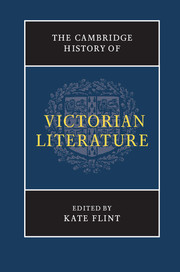Book contents
- Frontmatter
- Introduction
- PART I AUTHORS, READERS, AND PUBLISHERS
- PART II WRITING VICTORIA’s ENGLAND
- PART III MODES OF WRITING
- PART IV MATTERS OF DEBATE
- 15 Education
- 16 Spirituality
- 17 Material
- 18 Economics and finance
- 19 History
- 20 Sexuality
- 21 Aesthetics
- 22 Science and literature
- 23 Subjectivity, psychology, and the imagination
- 24 Cityscapes
- 25 The rural scene: Victorian literature and the natural world
- 26 ‘The annihilation of space and time’: literature and technology
- PART V SPACES OF WRITING
- PART VI VICTORIAN AFTERLIVES
- Select bibliography
- Index
25 - The rural scene: Victorian literature and the natural world
from PART IV - MATTERS OF DEBATE
Published online by Cambridge University Press: 28 March 2012
- Frontmatter
- Introduction
- PART I AUTHORS, READERS, AND PUBLISHERS
- PART II WRITING VICTORIA’s ENGLAND
- PART III MODES OF WRITING
- PART IV MATTERS OF DEBATE
- 15 Education
- 16 Spirituality
- 17 Material
- 18 Economics and finance
- 19 History
- 20 Sexuality
- 21 Aesthetics
- 22 Science and literature
- 23 Subjectivity, psychology, and the imagination
- 24 Cityscapes
- 25 The rural scene: Victorian literature and the natural world
- 26 ‘The annihilation of space and time’: literature and technology
- PART V SPACES OF WRITING
- PART VI VICTORIAN AFTERLIVES
- Select bibliography
- Index
Summary
In one of John Ruskin’s most celebrated passages of elegy, he recalled the pleasures of Croxted Lane, Dulwich. ‘In my young days’, he said, in Part 1 of Fiction, Fair and Foul (1880):
Croxted Lane was a green bye-road traversable for some distance by carts; but rarely so traversed, and, for the most part, little else than a narrow strip of untilled field, separated by blackberry hedges from the better-cared-for meadows on each side of it: growing more weeds, therefore, than they, and perhaps in spring a primrose or two – white archangel-daisies plenty, and purple thistles in autumn. A slender rivulet, boasting little of its brightness, for there are no springs at Dulwich, yet fed purely enough by the rain and morning dew, here trickled – there loitered – through the long grass beneath the hedges, and expanded itself, where it might, into moderately clear and deep pools, in which, under their veils of duck-weed, a fresh-water shell or two, sundry curious little skipping shrimps, any quantity of tadpoles in their time, and even sometimes a tittlebat, offered themselves to my boyhood’s pleasured, and not inaccurate, observation.
- Type
- Chapter
- Information
- The Cambridge History of Victorian Literature , pp. 532 - 549Publisher: Cambridge University PressPrint publication year: 2012

